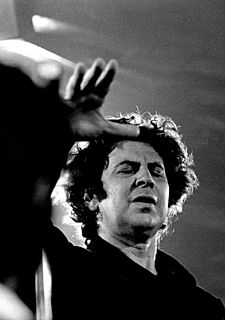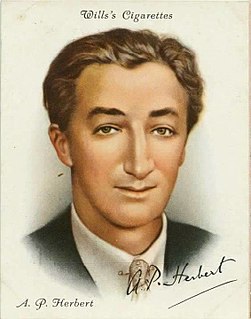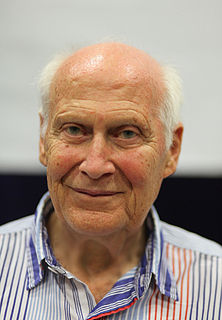A Quote by Robert Frost
The poet, as everyone knows, must strike his individual note sometime between the ages of fifteen and twenty-five. He may hold it a long time, or a short time, but it is then that he must strike it or never. School and college have been conducted with the almost express purpose of keeping him busy with something else till the danger of his ever creating anything is past.
Quote Topics
Related Quotes
I accept that friends of ours have decided that the President's non-strike has somehow impacted perceptions of us. But I believe they are dead wrong and I think the critics are dead wrong, and here's why. The President [Barack Obama] made his decision to strike. He announced his decision to strike publicly. And the purpose of the strike was to get the chemical weapons out of Syria. That's the purpose.
No one is ahead of his time, it is only that the particular variety of creating his time is the one that his contemporaries who are also creating their own time refuse to accept. For a very long time everybody refuses and then almost without a pause almost everybody accepts. In the history of the refused in the arts and literature the rapidity of the change is always startling.
We must never put our dreams of success as God's purpose for us; His purpose may be exactly the opposite. His purpose is that I depend on HIM and in HIS power NOW. His end is the process. It is the process, not the end, which is glorifying to God....His purpose is for this minute, not for something in the future. We have nothing to do with the 'afterwards' of obedience. If we have a further end in view, we do not pay sufficient attention to the immediate present; if we realize that obedience is the end, then each moment as it comes is precious.
And there you see the distinction between our feelings: had he been in my place, and I in his, though I hated him with a hatred that turned my life to gall, I never would have raised a hand against him. You may look incredulous, if you please! I never would have banished him from her society as long as she desired his. The moment her regard ceased, I would have torn his heart out and drank his blood! But, till then - if you don't believe me, you don't know me - til then, I would have died by inches before I touched a single hair on his head!
These principles laid down as in variable rules: that one must pay a card sharper, but need not pay a tailor; that one must never tell a lie to a man, but one may to a woman; that one must never cheat any one, but one may a husband; that one must never pardon an insult, but one may give one and so on. These principles were possibly not reasonable and not good, but they were of unfailing certainty, and so long as he adhered to them, Vronsky felt that his heart was at peace and he could hold his head up.
Have you ever noticed that Jesus is never recorded as taking a holiday? He retired for the purposes of his mission, not from it. He was never destroyed by his work; he was always on top of it. He moved among people as the master of every situation. He was busier than anyone; the multitudes were always at him, yet he had time, for everything and everyone. He was never hurried, or harassed, or too busy. He had complete supremacy over time; he never let it dictate to him. He talked of my time; my hour. He knew exactly when the moment had come for doing something and when it had not.
What does Reverence for Life say abut the relations between [humanity] and the animal world? Whenever I injury any kind of life I must be quite certain that it is necessary. I must never go beyond the unavoidable, not even in apparently insignificant things. The farmer who has mowed down a thousand flowers in his meadow in order to feed his cows must be careful on his way home not to strike the head off a single flower by the side of the road in idle amusement, for he thereby infringes on the law of life without being under the pressure of necessity.
You must therefore zealously guard in his mind the curious assumption 'My time is my own'. Let him have the feeling that he starts each day as the lawful possessor of twenty-four hours. Let him feel as a grievous tax that portion of this property which he has to make over to him employers, and as a generous donation that further portion which h allows to religious duties. But what he must never be permitted to doubt is that the total from which these deductions have been made was, in some mysterious sense, his own personal birthright.
When the family has been brought into its natural order, the individual can leave it behind him while still feeling the strength of his family supporting him. Only when the connection to his family is acknowledged, and the person's responsibility seen clearly and then distributed, can the individual feel unburdened and go about his personal affairs without anything from the past weighing him down or holding him back.
The Scoutmaster guides the boy in the spirit of an older brother... He has simply to be a boy-man, that is: (1) He must have the boy spirit in him: and must be able to place himself in the right plane with his boys as a first step. (2) He must realise the needs, outlooks and desires of the different ages of boy life. (3) He must deal with the individual boy rather than with the mass. (4) He then needs to promote a corporate spirit among his individuals to gain the best results.
I wish to suggest that a man may be very industrious, and yet not spend his time well. There is no more fatal blunderer than he who consumes the greater part of his life getting his living. All great enterprises are self-supporting. The poet, for instance, must sustain his body by his poetry, as a steam planing-mill feeds its boilers with the shavings it makes. You must get your living by loving.







































